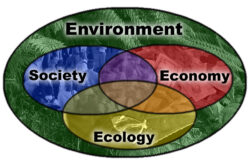 Abraham Lincoln
If given the truth, the people can be depended upon to meet any national crisis...
Abraham Lincoln
If given the truth, the people can be depended upon to meet any national crisis...
 Guildford news...
for Guildford people, brought to you by Guildford reporters - Guildford's own news service
Guildford news...
for Guildford people, brought to you by Guildford reporters - Guildford's own news service
Letter: Who Has The Spine to Tackle the Environmental Challenge? Published
Published on: 22 Apr, 2025
Updated on: 30 Apr, 2025
When I moved to Horsley in 1994, the apple trees in the garden were covered in lichen. Thanks to air pollution, there’s none left.
Meanwhile, where have all the insects gone? At different times of year, we used to have plagues of moths and daddy-longlegs, but no longer. There are hardly any bees, hoverflies or beetles despite my herculean feats of organic gardening.
The wood ants have vanished, along with most of the red ants’ nests in the lawn and the small black ants on the patio.
Despite the wet winter, there have been only a few worm casts on the grass. I haven’t seen a toad or hedgehog for years, and every Spring there are fewer newts in the pond. The dawn chorus, which used to be a cacophony, is now just a chamber choir.
The diversity of birds has dropped despite (or perhaps because of) the arrival of some red kites. Where there used to be six or seven birds’ nests in the garden, I now find only one or two.
I try to exclude roe deer, which are extremely destructive, but I’m sorry not to see them anymore in nearby fields.
This week I did find a grass snake, and we still have bats at dusk. Owls still hoot at night, but less loudly than in the past.
Of course, we are already well into Planet Earth’s sixth mass extinction, the first one due to include us as a species. This is only fair since, this time, it’s our fault. But I puzzle over why this imminent and not-insignificant prospect is not at the forefront of national and international politics.
One reason may be climate fatigue. For twenty years, the focus on decarbonising the atmosphere has sucked up so much moral outrage and political dispute on all sides that there is little left to direct at the mere destruction of nature, even if it means the end of life on Earth.
On top of other non-climate challenges such as global plastic pollution, the “nature crisis” is apt to evoke a hopeless shrug among a general public tired of one damn thing after another. In the US, “diversity” itself has now become a dirty word.
Theoretically at seventy, I ought to be getting crusty and conservative. But the rapid collapse of the natural world, including species loss, ecosystems decay, and reduced genetic diversity, makes me crave urgent, radical solutions.
Where is our political salvation? Our big national parties offer only a non-choice between hard/disciplinarian neoliberalism (Conservatives, Reform UK) and a softer/compensatory version of the same thing (Labour, Lib Dems): growth, growth and yet more growth for ever and ever, and hang the
consequences.
At the political fringes, the Green Party may have other ideas but it has been spectacularly apathetic towards local over-development. State bodies such as the Environment Agency that are supposed to protect us have been corrupted and hollowed out by austerity.
Incredibly, Buglife (Europe’s only insect conservation charity) even wrote to support plans by its donor, Taylor Wimpey, to plonk 1,700 houses on green fields in Wisley.
Sir David Attenborough said, “If we and the rest of the back-boned animals were to disappear overnight, the rest of the world would get on pretty well. But if the invertebrates were to disappear, the world’s ecosystems would collapse.”
No one, though, seems to have the backbone to do much about this. Is there no workable, alternative type of politics?

Click on cartoon for Dragon story: Public Asked for Views on SCC’s Proposal for Reduced Speed Limits






Recent Articles
- Work to Repair Cottage on Closed A281 Underway
- Letter: Not All PIP Claimants Need It
- AI Technology at the Forefront of Surrey Conservation Project
- Mayor of Guildford Drops In on One of His Chosen Charities
- The Church’s Message Is As Relevant As Ever, Says Ash’s Retiring Priest
- CANCELLED: Have a Blooming Picnic – June 7
- Eight Out of Ten PIP Claimants in Guildford Face Cuts to Their “Lifeline”
- Waverley’s New Discretionary CIL Review Scheme To Be Revealed Soon
- Council Accepts Responsibility of Meeting Farnham Museum’s Ballooning Repair Costs
- Notice: Cut It Out!


Search in Site
Media Gallery
Dragon Interview: Local Artist Leaves Her Mark At One of England’s Most Historic Buildings
January 21, 2023 / No Comment / Read MoreDragon Interview: Lib Dem Planning Chair: ‘Current Policy Doesn’t Work for Local People’
January 19, 2023 / No Comment / Read MoreA3 Tunnel in Guildford ‘Necessary’ for New Homes, Says Guildford’s MP
January 10, 2023 / No Comment / Read More‘Madness’ for London Road Scheme to Go Ahead Against ‘Huge Opposition’, Says SCC Leader
January 6, 2023 / No Comment / Read MoreCouncillor’s Son Starts Campaign for More Consultation on North Street Plan
December 30, 2022 / No Comment / Read MoreCounty Council Climbs Down Over London Road Works – Further ‘Engagement’ Period Announced
December 14, 2022 / No Comment / Read MoreDragon Interview: GBC Reaction to the Government’s Expected Decision to Relax Housing Targets
December 7, 2022 / No Comment / Read MoreHow Can Our Town Centre Businesses Recover? Watch the Shop Front Debate
May 18, 2020 / No Comment / Read More







Recent Comments